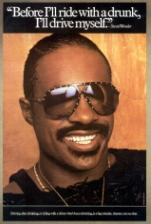I like this post (below) in particular because I find students tend to use shock value for the sake of shocking and not for the sake of selling (I don't know if the latter is possible honestly.) Sex, drugs, racism etc are all good and fun in private, but when it comes to your portfolio, tear those pages out. Be smart, not sexy. Be sophisticated and strategic. You don't have to be a stick in the mud, but don't rely on sophomoric jokes or banana peel gags to get your point across. United Colours of Benetton's recent ads created so much of a stir that you totally missed the point, and missed what they were selling. Don't Benetton your book.
The Down Side Of Edgy Humor
by Ad Teachings
Pretty early in an advertising career, creatives discover that there’s something to be gained by being, as we say, edgy. If we can produce an ad that makes people gasp and say, “I can’t believe they did that,” there’s a good chance we’ll be able to leapfrog into people’s awareness, and possibly into the award shows as well.
As an example, here’s a big award winner done by Fallon McElligott Rice in the 1980s:

Sorry for the tiny file. The ad shows Stevie Wonder saying, “Before I’ll ride with a drunk, I’ll drive myself.” It’s pretty tame by today’s standards, but I remember at the time palming my face in disbelief. What saved the ad was its excellent message and the fact that Stevie Wonder was obviously in on the joke.
Sometimes, though, you’ll see ads that use shock for its own sake, only pretending to have some nobler purpose in mind. The example that comes to mind is the use of Hitler in advertising – something that seems to happen every five years or so. Most recently, a German agency used Hitler as a metaphor for the scourge of AIDS. What made the agency’s intentions suspect was their decision to show Hitler in a raunchy sexual embrace with a beautiful woman. Google it if you must, but I would say that if you’re thinking of using Hitler in an ad, the best guidance I can give you is please don’t.
With our desire to be edgy, there’s often a terrible frustration when clients aren’t willing to approve the work. But please remember that the price of edginess often has to be paid long after awards season is over. A number of years ago, a Canadian commercial got yanked off the air because it made a joking reference to suicide. It was the kind of reference that would go unnoticed on The Simpsons, but because it was in an ad, the client had to field dozens of complaints from people whose loved ones had taken their own lives. In that case, the client probably regretted ever taking the risk in the first place.
And sometimes, the consequences of being shocking are such that no apology or explanation will erase them. A case in point: The staff of a law firm in New York celebrated this past Halloween by dressing up as people left homeless because of mortgage foreclosures. To make matters worse, this firm actually made its money by carrying out those foreclosures.

As a direct result of this exercise in edginess, the firm has now closed down, and 89 people are out of work. You can read the story here: http://dealbook.nytimes.com/2011/11/21/foreclosure-firm-steven-j-baum-to-close-down/
One of the happiest days of your life in advertising will be the day you realize you actually can come up with ideas, all sorts of ideas, and not just one or two at a time. When you feel that confidence, you won’t be upset that your shocking work got rejected. You’ll just go back and do something that’s less shocking than it is, say, arresting. As the great creative director Lee Clow said, “The best revenge is a better ad.”
